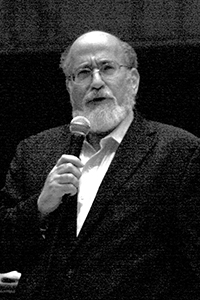
Joseph Telushkin, rabbi, lecturer, ethicist, novelist, playwright and author, spoke on material from his most recent book ‘Hillel: If Not Now, When?’ on Thursday night at Binghamton University.
The lecture focused on the ethics of Judaism and the teachings of the rabbinic figure, Hillel.
Telushkin said his book’s premise is that Hillel can be just as relevant today as when he lived more than 2,000 years ago.
‘Hillel offered an alternative mode of religiosity,’ Telushkin said. ‘He was very aware of basic ethical issues.’
These ethics can be applied to any life, regardless of age, according to Telushkin.
He also noted that Hillel created a lot of clich√É©s that have been adopted into modern speech.
‘Because the teachings turned into clich√É©s, they lost some of their freshness,’ Telushkin said.
His goal with the book and on the tour is to restore Hillel and revive those messages. The idea is that people can spend too much time comparing their levels of religion instead of paying attention to being ethical.
According to Shana Kantor, executive director of Hillel at Binghamton, this is commonly seen among students on campus, and the book has caused some controversy in the Jewish community.
‘He said ethics are more important than Jewish law,’ Kantor said. ‘But the message of ethical Judaism is an amazing one for today.’
Teachings of Hillel that Telushkin touched upon during his speech included the importance of community, not judging others too harshly, and not treating others in a way one wouldn’t want for oneself.
Or in Hillel’s words, ‘That which is hateful to you, do not do to your fellow.’
Telushkin utilized humor and personal anecdotes to communicate with the audience, whom he frequently called upon for participation. He included serious tones while other moments caused the audience to erupt in laughter.
Though turnout at the speech consisted mostly of community members, some students were in attendance. BU is one of 10 stops on a northeastern college tour that also includes visits to Cornell, Brown and Rutgers. An anonymous donor funded the trip.
Lynne B. Harrison, a leader on the Hillel International Board of Directors and Jewish philanthropist, was the visionary behind the tour.
‘My goal is to get [the book] into the hands of every Jewish student,’ Dr. Harrison said.
She noted this time in students’ lives as crucial because of their potential to be influenced and impacted before they go out into the real world.
‘One student at Rutgers described the talk as a life-changing event,’ she said.
Kantor described Telushkin as the most widely read author in Jewish subject matter in the United States, whose books are usually given during an important Jewish moment in life, such as a Bar or Bat Mitzvah.
At the age of 26, Telushkin published his first book called ‘Nine Questions People Ask About Judaism.’ Sixteen books later, Telushkin is not finished yet. His next book will be about the Lubavitcher Rebbe, the Hasidic leader of the Chabad-Lubavitch sect of Judaism. He will focus on the source of the Rebbe’s charisma and how he led such an influential movement.


